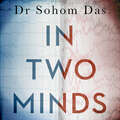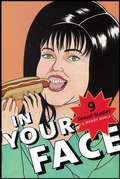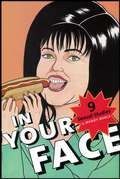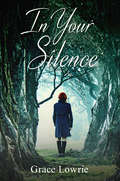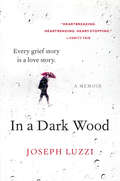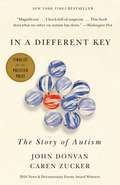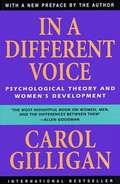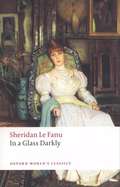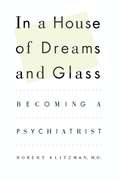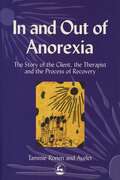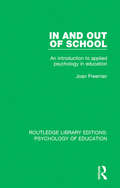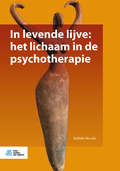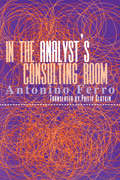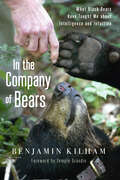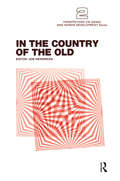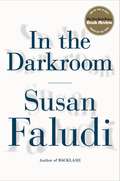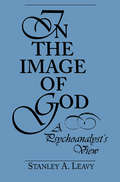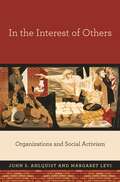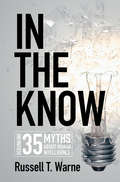- Table View
- List View
In Two Minds: Stories of murder, justice and recovery from a forensic psychiatrist
by Dr Sohom DasShocking, eye-opening and grimly fascinating, these are the true stories, patients and cases that have characterised a career spent treating mentally disordered offenders.Listen to the end of the audiobook for an exclusive bonus chapter, written and read by the author.As a forensic psychiatrist, it's Dr Das's job to treat and rehabilitate what the tabloids might call the 'criminally insane', many of whom assault, rob, rape, and even kill. His work takes him to high-security prisons and securely locked hospital wards across the country, as well as inside courtrooms, giving evidence as an expert witness.From the young woman who smothered her two-year-old nephew in a flash of psychosis, to the teenager who set his house on fire with his mother locked inside, Dr Das must delve into the minds of these violent offenders to elicit their symptoms of mental illness, understand their actions and prevent future atrocities.In this honest, revealing and at times humorous memoir, Dr Das shares stories from his fifteen years as a psychiatric doctor working with this dangerous clientele, detailing some of his most extreme, heart-breaking and bizarre cases - and how he's learned to live with his mistakes when the worse happens.Compelling, enlightening and candid, if you enjoyed Unnatural Causes, Dark Side of the Mind or The Prison Doctor, you'll love IN TWO MINDS.
In Your Face
by Mandy MerckAt a time when "sexy" can be an adjective for anything, when sexual awareness is declared to be advancing faster in months than in the past half century, and when pundits warn of sexual overload, the actual representation of sex is still deemed confrontational, aggressive, "in your face." While critics accuse the academy of an obsession with sexuality, they also complain that nothing that appears to refer to sex really does. In readings ranging across film, drama, opera, fine art, and critical theory, Mandy Merck considers these phenomena as well as the role of the dog in anti-porn propaganda, the unacknowledged significance of the lesbian hand, and the early retirement of the phallus. Other topics include the relationship of women's tennis and prostitution, the gendering of the wild and the tame in the age of AIDS, and the sexlessness of postmodern criticism. In Your Face ends with the face and its alleged desecration by fellatio. Germaine Greer's condemnation of Bill Clinton for "fucking the faces of little girls" is examined in the light of one of Monica Lewinsky's endearments for the President--"fuckface." In a country whose last great Presidential scandal revolved around a key witness known only as "Deep Throat" and whose current Chief Executive works in the "Oral Office," giving head is going down in history. Analyzing the strange relationship of Linda Lovelace, Camille Paglia, and Paul de Man, In Your Face concludes by considering desire and disgust in high and low places.
In Your Face: 9 Sexual Studies (Sexual Cultures #7)
by Mandy MerckAt a time when "sexy" can be an adjective for anything, when sexual awareness is declared to be advancing faster in months than in the past half century, and when pundits warn of sexual overload, the actual representation of sex is still deemed confrontational, aggressive, "in your face." While critics accuse the academy of an obsession with sexuality, they also complain that nothing that appears to refer to sex really does. In readings ranging across film, drama, opera, fine art, and critical theory, Mandy Merck considers these phenomena as well as the role of the dog in anti-porn propaganda, the unacknowledged significance of the lesbian hand, and the early retirement of the phallus. Other topics include the relationship of women's tennis and prostitution, the gendering of the wild and the tame in the age of AIDS, and the sexlessness of postmodern criticism. In Your Face ends with the face and its alleged desecration by fellatio. Germaine Greer's condemnation of Bill Clinton for "fucking the faces of little girls" is examined in the light of one of Monica Lewinsky's endearments for the President--"fuckface." In a country whose last great Presidential scandal revolved around a key witness known only as "Deep Throat" and whose current Chief Executive works in the "Oral Office," giving head is going down in history. Analyzing the strange relationship of Linda Lovelace, Camille Paglia, and Paul de Man, In Your Face concludes by considering desire and disgust in high and low places.
In Your Silence: The Wildham Series (The Wildham Series #3)
by Grace LowrieReeling from his ex-girlfriend Cally's disappearance, Liam, a giant of a man and teetotaller, wins a commission to restore the neglected grounds of a mansion, Wildham Hall, for its owner Gregory Sinclair. It is there that Liam meets Gregory's daughter Melody, who is mute. Liam has always suppressed the darkest side of himself, but as his clandestine liaison with Melody develops, she tests him and his deepest desires are dragged to the surface.
In Your Silence: The Wildham Series (The\wildham Ser. #3)
by Grace LowrieReeling from his ex-girlfriend Cally's disappearance, Liam, a giant of a man and teetotaller, wins a commission to restore the neglected grounds of a mansion, Wildham Hall, for its owner Gregory Sinclair. It is there that Liam meets Gregory's daughter Melody, who is mute. Liam has always suppressed the darkest side of himself, but as his clandestine liaison with Melody develops, she tests him and his deepest desires are dragged to the surface.
In a Dark Wood: A Memoir
by Joseph LuzziA “heartbreaking, heartrending, heart-stopping” memoir of a literature professor’s personal journey to hell and back (Vanity Fair).On a cold November morning, Joseph Luzzi, a Dante scholar and professor at Bard College, found himself racing to the hospital—his wife, Katherine, eight-and-a-half months pregnant, had been in a horrible car accident. In one terrible instant, Luzzi became both a widower and a first-time father.In the aftermath of unthinkable tragedy, Luzzi relied on the support of his Italian immigrant family, returning to his childhood home to grieve and care for his infant daughter. But it wasn’t until he turned to The Divine Comedy—a poem he had devoted his life to studying and teaching—that he learned how to resurrect his life. Following the same structure as Dante’s epic poem, Luzzi is shepherded out of his own “dark wood,” passing through the grief-stricken Inferno, the Purgatory of healing, and ultimately stepping into the Paradise of rediscovered love. In a Dark Wood is a hybrid of heartrending memoir and a meditation on the power of great art to give us strength in our darkest moments. Drawing us into hell and back, it is Dante’s journey, Joseph Luzzi’s, and our very own.“Luzzi unites emotion and ideas in a work that defies categorization, except for the category marked ‘brilliant.’ If every academic wrote like this, the humanities would be prospering.” —Gary Shteyngart, New York Times–bestselling author of Our Country Friends“Achingly beautiful.” —Entertainment Weekly“This is not an academic book about Dante. It’s an elegant and moving memoir of one man’s journey through grief and finally back to life.” —Albany Times-Union
In a Different Key
by Caren Zucker John DonvanNearly seventy-five years ago, Donald Triplett of Forest, Mississippi became the first child diagnosed with autism. Beginning with his family's odyssey, In a Different Key tells the extraordinary story of this often misunderstood condition, and of the civil rights battles waged by the families of those who have it. Unfolding over decades, it is a beautifully rendered history of ordinary people determined to secure a place in the world for those with autism--by liberating children from dank institutions, campaigning for their right to go to school, challenging expert opinion on what it means to have autism, and persuading society to accept those who are different. It is the story of women like Ruth Sullivan, who rebelled against a medical establishment that blamed cold and rejecting "refrigerator mothers" for causing autism; and of fathers who pushed scientists to dig harder for treatments. Many others played starring roles too: doctors like Leo Kanner, who pioneered our understanding of autism; lawyers like Tom Gilhool, who took the families' battle for education to the courtroom; scientists who sparred over how to treat autism; and those with autism, like Temple Grandin, Alex Plank, and Ari Ne'eman, who explained their inner worlds and championed the philosophy of neurodiversity. This is also a story of fierce controversies--from the question of whether there is truly an autism "epidemic," and whether vaccines played a part in it; to scandals involving "facilitated communication," one of many treatments that have proved to be blind alleys; to stark disagreements about whether scientists should pursue a cure for autism. There are dark turns too: we learn about experimenters feeding LSD to children with autism, or shocking them with electricity to change their behavior; and the authors reveal compelling evidence that Hans Asperger, discoverer of the syndrome named after him, participated in the Nazi program that consigned disabled children to death.By turns intimate and panoramic, In a Different Key takes us on a journey from an era when families were shamed and children were condemned to institutions to one in which a cadre of people with autism push not simply for inclusion, but for a new understanding of autism: as difference rather than disability.
In a Different Key: The Story of Autism
by Caren Zucker John DonvanAn extraordinary narrative history of autism: the riveting story of parents fighting for their children 's civil rights; of doctors struggling to define autism; of ingenuity, self-advocacy, and profound social changeNearly seventy-five years ago, Donald Triplett of Forest, Mississippi, became the first child diagnosed with autism. Beginning with his family's odyssey, In a Different Key tells the extraordinary story of this often misunderstood condition, and of the civil rights battles waged by the families of those who have it. Unfolding over decades, it is a beautifully rendered history of ordinary people determined to secure a place in the world for those with autism--by liberating children from dank institutions, campaigning for their right to go to school, challenging expert opinion on what it means to have autism, and persuading society to accept those who are different. It is the story of women like Ruth Sullivan, who rebelled against a medical establishment that blamed cold and rejecting "refrigerator mothers" for causing autism; and of fathers who pushed scientists to dig harder for treatments. Many others played starring roles too: doctors like Leo Kanner, who pioneered our understanding of autism; lawyers like Tom Gilhool, who took the families' battle for education to the courtroom; scientists who sparred over how to treat autism; and those with autism, like Temple Grandin, Alex Plank, and Ari Ne'eman, who explained their inner worlds and championed the philosophy of neurodiversity. This is also a story of fierce controversies--from the question of whether there is truly an autism "epidemic," and whether vaccines played a part in it; to scandals involving "facilitated communication," one of many treatments that have proved to be blind alleys; to stark disagreements about whether scientists should pursue a cure for autism. There are dark turns too: we learn about experimenters feeding LSD to children with autism, or shocking them with electricity to change their behavior; and the authors reveal compelling evidence that Hans Asperger, discoverer of the syndrome named after him, participated in the Nazi program that consigned disabled children to death.By turns intimate and panoramic, In a Different Key takes us on a journey from an era when families were shamed and children were condemned to institutions to one in which a cadre of people with autism push not simply for inclusion, but for a new understanding of autism: as difference rather than disability.From the Hardcover edition.
In a Different Key: The Story of Autism
by Caren Zucker John DonvanAn extraordinary narrative history of autism: the riveting story of parents fighting for their children ’s civil rights; of doctors struggling to define autism; of ingenuity, self-advocacy, and profound social changeNearly seventy-five years ago, Donald Triplett of Forest, Mississippi, became the first child diagnosed with autism. Beginning with his family’s odyssey, In a Different Key tells the extraordinary story of this often misunderstood condition, and of the civil rights battles waged by the families of those who have it. Unfolding over decades, it is a beautifully rendered history of ordinary people determined to secure a place in the world for those with autism—by liberating children from dank institutions, campaigning for their right to go to school, challenging expert opinion on what it means to have autism, and persuading society to accept those who are different. It is the story of women like Ruth Sullivan, who rebelled against a medical establishment that blamed cold and rejecting “refrigerator mothers” for causing autism; and of fathers who pushed scientists to dig harder for treatments. Many others played starring roles too: doctors like Leo Kanner, who pioneered our understanding of autism; lawyers like Tom Gilhool, who took the families’ battle for education to the courtroom; scientists who sparred over how to treat autism; and those with autism, like Temple Grandin, Alex Plank, and Ari Ne’eman, who explained their inner worlds and championed the philosophy of neurodiversity. This is also a story of fierce controversies—from the question of whether there is truly an autism “epidemic,” and whether vaccines played a part in it; to scandals involving “facilitated communication,” one of many treatments that have proved to be blind alleys; to stark disagreements about whether scientists should pursue a cure for autism. There are dark turns too: we learn about experimenters feeding LSD to children with autism, or shocking them with electricity to change their behavior; and the authors reveal compelling evidence that Hans Asperger, discoverer of the syndrome named after him, participated in the Nazi program that consigned disabled children to death.By turns intimate and panoramic, In a Different Key takes us on a journey from an era when families were shamed and children were condemned to institutions to one in which a cadre of people with autism push not simply for inclusion, but for a new understanding of autism: as difference rather than disability.— Washington Post, Notable Non-fiction Books in 2016— WBUR, Best Books of 2016— Wall Street Journal, Best Books of the Year
In a Different Key: The Story of Autism
by Caren Zucker John DonvanAn extraordinary narrative history of autism: the riveting story of parents fighting for their children ’s civil rights; of doctors struggling to define autism; of ingenuity, self-advocacy, and profound social changeNearly seventy-five years ago, Donald Triplett of Forest, Mississippi, became the first child diagnosed with autism. Beginning with his family’s odyssey, In a Different Key tells the extraordinary story of this often misunderstood condition, and of the civil rights battles waged by the families of those who have it. Unfolding over decades, it is a beautifully rendered history of ordinary people determined to secure a place in the world for those with autism—by liberating children from dank institutions, campaigning for their right to go to school, challenging expert opinion on what it means to have autism, and persuading society to accept those who are different. It is the story of women like Ruth Sullivan, who rebelled against a medical establishment that blamed cold and rejecting “refrigerator mothers” for causing autism; and of fathers who pushed scientists to dig harder for treatments. Many others played starring roles too: doctors like Leo Kanner, who pioneered our understanding of autism; lawyers like Tom Gilhool, who took the families’ battle for education to the courtroom; scientists who sparred over how to treat autism; and those with autism, like Temple Grandin, Alex Plank, and Ari Ne’eman, who explained their inner worlds and championed the philosophy of neurodiversity. This is also a story of fierce controversies—from the question of whether there is truly an autism “epidemic,” and whether vaccines played a part in it; to scandals involving “facilitated communication,” one of many treatments that have proved to be blind alleys; to stark disagreements about whether scientists should pursue a cure for autism. There are dark turns too: we learn about experimenters feeding LSD to children with autism, or shocking them with electricity to change their behavior; and the authors reveal compelling evidence that Hans Asperger, discoverer of the syndrome named after him, participated in the Nazi program that consigned disabled children to death.By turns intimate and panoramic, In a Different Key takes us on a journey from an era when families were shamed and children were condemned to institutions to one in which a cadre of people with autism push not simply for inclusion, but for a new understanding of autism: as difference rather than disability.
In a Different Key: The Story of Autism
by Caren Zucker John DonvanAn extraordinary narrative history of autism: the riveting story of parents fighting for their children ’s civil rights; of doctors struggling to define autism; of ingenuity, self-advocacy, and profound social changeNearly seventy-five years ago, Donald Triplett of Forest, Mississippi, became the first child diagnosed with autism. Beginning with his family’s odyssey, In a Different Key tells the extraordinary story of this often misunderstood condition, and of the civil rights battles waged by the families of those who have it. Unfolding over decades, it is a beautifully rendered history of ordinary people determined to secure a place in the world for those with autism—by liberating children from dank institutions, campaigning for their right to go to school, challenging expert opinion on what it means to have autism, and persuading society to accept those who are different. It is the story of women like Ruth Sullivan, who rebelled against a medical establishment that blamed cold and rejecting “refrigerator mothers” for causing autism; and of fathers who pushed scientists to dig harder for treatments. Many others played starring roles too: doctors like Leo Kanner, who pioneered our understanding of autism; lawyers like Tom Gilhool, who took the families’ battle for education to the courtroom; scientists who sparred over how to treat autism; and those with autism, like Temple Grandin, Alex Plank, and Ari Ne’eman, who explained their inner worlds and championed the philosophy of neurodiversity. This is also a story of fierce controversies—from the question of whether there is truly an autism “epidemic,” and whether vaccines played a part in it; to scandals involving “facilitated communication,” one of many treatments that have proved to be blind alleys; to stark disagreements about whether scientists should pursue a cure for autism. There are dark turns too: we learn about experimenters feeding LSD to children with autism, or shocking them with electricity to change their behavior; and the authors reveal compelling evidence that Hans Asperger, discoverer of the syndrome named after him, participated in the Nazi program that consigned disabled children to death.By turns intimate and panoramic, In a Different Key takes us on a journey from an era when families were shamed and children were condemned to institutions to one in which a cadre of people with autism push not simply for inclusion, but for a new understanding of autism: as difference rather than disability.
In a Different Voice
by Carol GilliganThis is the little book that started a revolution. First published almost twenty years ago, it made women's voices heard, in their own right and with their own integrity, for virtually the first time in social scientific theorizing about women. Its impact was immediate and continues to this day, in the academic world and beyond. Translated into sixteen languages, with more than three-quarters of a million copies sold around the world. In a Different Voice has inspired new research, new educational initiatives, and political debate-and helped many women and men to see themselves and each other in a different light. Carol Gilligan believes that psychology has persistently and systematically misunderstood women--their motives, their moral commitments, the course of their psychological growth, and their special view of what is important in life. Here she sets out to correct psychology's misperceptions and refocus its view of female personality. The result is truly a tour de force, which may well reshape much of what psychology now has to say about female experience.
In a Glass Darkly
by J. Sheridan Le Fanu Robert Tracy`the ideal reading. . . for the hours after midnight' Thus Henry James described the style of supernatural tale of which Sheridan Le Fanu was a master. Known in nineteenth-century Dublin as `The Invisible Prince' because of his reclusive and nocturnal habits, Le Fanu was fascinated by the occult. His writings draw on the Gothic tradition, elements ofIrish folklore, and even on the social and political anxieties of his Anglo-Irish contemporaries. In exploring sometimes inexplicable terrors, the tales focus on the unease of the haunted men and women who encounter the supernatural, rather than on the origin or purpose of the visitant. This makesfor spine-chilling reading. The five stories presented here have been collected by Dr Hesselius, a `metaphysical' doctor, the forerunner of the modern psychiatrist, who is willing to consider the ghosts both as real and as hallucinatory obsessions. The reader's doubtful anxiety mimics that of the protagonist, and each storythus creates that atmosphere of mystery which is the supernatural experience.
In a House of Dreams and Glass: Becoming a Psychiatrist
by Robert KlitzmanFresh from medical school, Robert Klitzman began his residency in psychiatry with excitement and a sense of mission. But he was not prepared for what he found inside the city psychiatric center where he was to spend three grueling years. In truth, as Dr. Klitzman's absorbing account of his apprenticeship reveals, he never ceased to be surprised--by his patients, by the senior psychiatrists' conflicting advice on how to help them, and by the unpredictable results of the therapies, both psychoanalytic and biologic, that he and his fellow residents practiced. Nights in the emergency room, professional controversy, the minefield of hospital politics, the stress of his own therapy--everything is here, in a passionate and illuminating analysis of a doctor's struggle against tremendous odds to banish his patients' demons.
In and Out of Anorexia: The Story of the Client, the Therapist and the Process of Recovery
by Tammie Ronen Ayelet PolsterAyelet spent six years of her adolescence in and out of hospital, having been diagnosed as suffering from a severe anorexia disorder. She is now a special needs teacher. In the first part of this book Ayelet describes her personal experiences of the illness, the repeated hospitalisations and her ultimate recovery, illustrated with examples of her drawing and writing from when she was ill. Tammie Ronen, her therapist, outlines the step-by-step progress of the therapy from the professional angle, describing in detail the decision-making and treatment considerations specific to Ayelet's life and context. She also includes comprehensive overviews of contemporary research into anorexia and of cognitive constructivist methods. This interweaving of theory, practice and personal experience offers the reader unique insight into the reality of the illness and demonstrates the effectiveness of integrative and creative methods, and the central importance of a good relationship between the client and the therapist. The book is a rich source of inspiration and guidance for therapists and other professionals, as well as for people with eating disorders and their families.
In and Out of School: An Introduction to Applied Psychology in Education (Routledge Library Editions: Psychology of Education)
by Joan FreemanOriginally published in 1975, this book aimed to throw light on the practical use of psychology in children’s education, for the benefit of students, practising teachers, parents, or anyone concerned with education. Both educators and educated are considered, and particular attention is given to the behaviour of the whole person, both inside and outside the bounds of conventional teaching practice.
In levende lijve: het lichaam in de psychotherapie
by Nelleke NicolaiDit boek laat zien wat het lichaam van een patiënt de psychotherapeut in klinische situaties kan vertellen. Het helpt om lichaamstaal te leren zien en te interpreteren, om beter te begrijpen wat patiënten je vertellen. Aan de hand van filosofische, intersubjectieve en neurobiologische theorieën legt het uit waar je op kunt letten, en beschrijft het specifieke lichaamsgerichte interventies. Het boek is bedoeld voor psychiaters, psychologen en psychotherapeuten, maar is ook geschikt voor de geïnteresseerde leek. Het lichaam in psychotherapie begint met een korte inleiding in de gedachten over lichaam en geest in de psychiatrie en de filosofie. Vervolgens behandelt het in verschillende hoofdstukken onder meer de geschiedenis van het lichaam in de psychotherapie, de functie van de beide hersenhelften, de huidgrens en de effecten van sociale aanraking. Daarna volgen hoofdstukken over neuroceptie, interoceptie en ons lichaam in relatie met anderen. De laatste hoofdstukken gaan over de klinische praktijk van het niet-ervaren lichaam, verhalen van patiënten die in verwarring zijn over hun lichaam, en de lichamelijke respons van de psychotherapeut in de somatische resonantie en de tegenoverdracht.
In the Analyst's Consulting Room
by Antonino FerroIn The Bi-Personal Field: Experiences in Child Analysis, Antonino Ferro devised a new model of the relationship between patient and analyst. In the Analyst's Consulting Room complements and develops this model by concentrating on adults.From the standpoint of the "analytic field", Antonino Ferro explores basic psychoanalytic concepts, such as criteria for analysability and ending the analysis, transformations that occur during the session, the impasse and negative therapeutic reactions, sexuality and setting. The author explores certain themes in greater depth, including:* ways in which characters that appear during sessions can be interpreted* continual indications given by the patient during the emotional upheavals of the field* the function of "narrator" which the analyst takes on to mark the boundaries of the possible worlds.Through clinical narrative, Ferro renders Bion's often complex ideas in a very personal and accessible way, making this book invaluable for psychoanalysts, psychotherapists, psychiatrists and psychologists.
In the Company of Bears: What Black Bears Have Taught Me about Intelligence and Intuition
by Benjamin Kilham"Like Jane Goodall&’s studies of chimps, Ben Kilham&’s work with black bears is more than just revealing: it&’s revolutionary. . . Ben&’s work will transform our understanding of how animals live—and how science should be done."—Sy Montgomery, author of The Soul of an OctopusIn In the Company of Bears, originally published in hardcover as Out on a Limb, Ben Kilham invites us into the world he has come to know best: the world of black bears.For decades, Kilham has studied wild black bears in a vast tract of Northern New Hampshire woodlands. At times, he has also taken in orphaned infants–feeding them, walking them through the forest for months to help them decipher their natural world, and eventually reintroducing them back into the wild. Once free, the orphaned bears still regard him as their mother. And one of these bears, now a 17-year-old female, has given him extraordinary access to her daily life, opening a rare window into how she and the wild bears she lives among carry out their daily lives, raise their young, and communicate.Witnessing this world has led to some remarkable discoveries. For years, scientists have considered black bears to be mostly solitary. Kilham&’s observations, though, reveal the extraordinary interactions wild bears have with each other. They form friendships and alliances; abide by a code of conduct that keeps their world orderly; and when their own food supplies are ample, they even help out other bears in need. Could these cooperative behaviors, he asks, mimic behavior that existed in the animal that became human? In watching bears, do we see our earliest forms of communications unfold?Kilham&’s dyslexia once barred him from getting an advanced academic degree, securing funding for his research, and publishing his observations in the scientific literature. After being shunned by the traditional scientific community, though, Kilham&’s unique findings now interest bear researchers worldwide. His techniques even aid scientists working with pandas in China and bears in Russia. Moreover, the observation skills that fueled Kilham&’s exceptional work turned out to be born of his dyslexia. His ability to think in pictures and decipher systems makes him a unique interpreter of the bear&’s world.In the Company of Bears delivers Kilham&’s fascinating glimpse at the inner world of bears, and also makes a passionate case for science, and education in general, to open its doors to different ways of learning and researching–doors that could lead to far broader realms of discovery.
In the Country of the Old (Perspectives On Aging And Human Development Ser.)
by Jon HendricksAging is a universal experience, and an individual one. But it is also a cultural phenomenon. Our ethnic and social background has a strong influence on how we deal with growing old. This collection draws on research from around the world to explore how cultural context shapes and defines the aging process. Studies examine differing patterns in the lives of the aged in Portugal, Polynesia, Sweden, and Israel, and among ethnic groups in the United States.
In the Darkroom
by Susan FaludiFrom the Pulitzer Prize-winning journalist and bestselling author of Backlash, comes In the Darkroom, an astonishing confrontation with the enigma of her father and the larger riddle of identity consuming our age. "In the summer of 2004 I set out to investigate someone I scarcely knew, my father. The project began with a grievance, the grievance of a daughter whose parent had absconded from her life. I was in pursuit of a scofflaw, an artful dodger who had skipped out on so many things--obligation, affection, culpability, contrition. I was preparing an indictment, amassing discovery for a trial. But somewhere along the line, the prosecutor became a witness. " So begins Susan Faludi's extraordinary inquiry into the meaning of identity in the modern world and in her own haunted family saga. When the feminist writer learned that her 76-year-old father--long estranged and living in Hungary--had undergone sex reassignment surgery, that investigation would turn personal and urgent. How was this new parent who identified as "a complete woman now" connected to the silent, explosive, and ultimately violent father she had known, the photographer who'd built his career on the alteration of images? Faludi chases that mystery into the recesses of her suburban childhood and her father's many previous incarnations: American dad, Alpine mountaineer, swashbuckling adventurer in the Amazon outback, Jewish fugitive in Holocaust Budapest. When the author travels to Hungary to reunite with her father, she drops into a labyrinth of dark histories and dangerous politics in a country hell-bent on repressing its past and constructing a fanciful--and virulent--nationhood. The search for identity that has transfixed our century was proving as treacherous for nations as for individuals. Faludi's struggle to come to grips with her father's metamorphosis takes her across borders--historical, political, religious, sexual--to bring her face to face with the question of the age: Is identity something you "choose," or is it the very thing you can't escape?
In the Image of God: A Psychoanalyst's View
by Stanley LeavyIn the Image of God is a compilation of lectures by Stanley Leavy, a psychoanalyst approaching retirement, reflecting on his experience as a follower of Freud and his method and also as a lifelong, faithful Episcopalian. The overarching idea linking the individual lectures is Leavy's belief that "the deliberate study of the operations of the mind must yield results that are not just compatible with religious faith but amplify it," eschewing the faith versus science argument for a more inclusive worldview.
In the Interest of Others: Organizations and Social Activism
by Margaret Levi John S. AhlquistA groundbreaking study of labor unions that advances a new theory of organizational leadership and governanceIn the Interest of Others develops a new theory of organizational leadership and governance to explain why some organizations expand their scope of action in ways that do not benefit their members directly. John Ahlquist and Margaret Levi document eighty years of such activism by the International Longshore and Warehouse Union in the United States and the Waterside Workers Federation in Australia. They systematically compare the ILWU and WWF to the Teamsters and the International Longshoremen's Association, two American transport industry labor unions that actively discouraged the pursuit of political causes unrelated to their own economic interests.Drawing on a wealth of original data, Ahlquist and Levi show how activist organizations can profoundly transform the views of members about their political efficacy and the collective actions they are willing to contemplate. They find that leaders who ask for support of projects without obvious material benefits must first demonstrate their ability to deliver the goods and services members expect. These leaders must also build governance institutions that coordinate expectations about their objectives and the behavior of members.In the Interest of Others reveals how activist labor unions expand the community of fate and provoke preferences that transcend the private interests of individual members. Ahlquist and Levi then extend this logic to other membership organizations, including religious groups, political parties, and the state itself.
In the Know: Debunking 35 Myths about Human Intelligence
by Russell T. WarneEmotional intelligence is an important trait for success at work. IQ tests are biased against minorities. Every child is gifted. Preschool makes children smarter. Western understandings of intelligence are inappropriate for other cultures. These are some of the statements about intelligence that are common in the media and in popular culture. But none of them are true. In the Know is a tour of the most common incorrect beliefs about intelligence and IQ. Written in a fantastically engaging way, each chapter is dedicated to correcting a misconception and explains the real science behind intelligence. Controversies related to IQ will wither away in the face of the facts, leaving readers with a clear understanding about the truth of intelligence.
In the Life: Versions of the Criminal Experience
by Bruce JacksonInterviews with those who are or were incarcerated.
